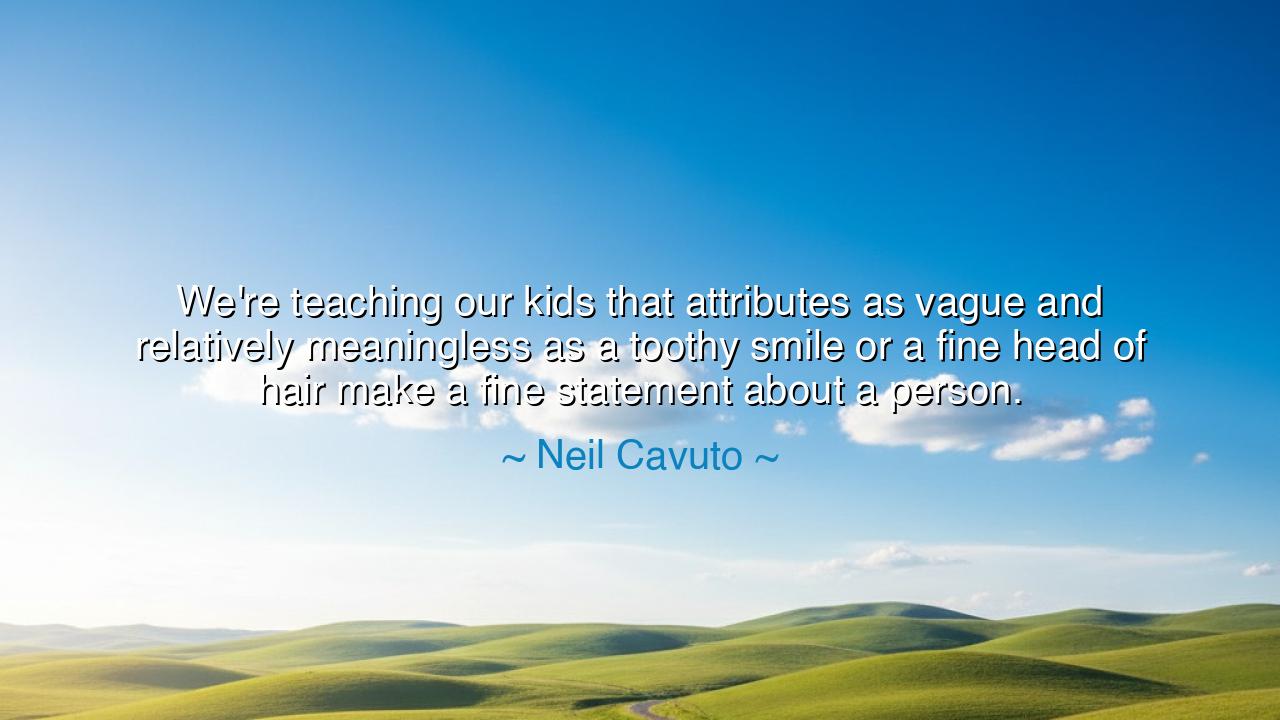
We're teaching our kids that attributes as vague and relatively
We're teaching our kids that attributes as vague and relatively meaningless as a toothy smile or a fine head of hair make a fine statement about a person.






The words of Neil Cavuto strike like a stern warning to a distracted generation: “We’re teaching our kids that attributes as vague and relatively meaningless as a toothy smile or a fine head of hair make a fine statement about a person.” At first, his observation may sound light, even trivial. But beneath the humor lies a profound indictment of modern values—the exaltation of appearance over character, surface over substance. Cavuto calls us to awaken, to recognize that we risk raising a generation blind to the deeper measures of worth.
The smile and the hair, though outwardly pleasant, are but fleeting ornaments. They may charm, but they cannot endure the trials of life, nor do they reveal the strength of the soul within. In the marketplaces of ancient Athens, men were often praised for their eloquence of tongue or their beauty of form. Yet Socrates, himself mocked for his plain looks, declared that virtue and wisdom were the true adornments of a person. Cavuto echoes this same truth: if we teach our children to judge by the smile rather than by integrity, we condemn them to a shallow vision of humanity.
Consider the lessons of history. In Rome, emperors often adorned themselves with gold, sculpted their images in marble, and paraded in grandeur. Yet the empire did not fall because their hair grew thin or their smiles faded. It collapsed because of corruption, greed, and the neglect of virtue. By contrast, leaders like Marcus Aurelius, though less dazzling in appearance, are remembered for their wisdom, their humility, their devotion to justice. What mattered was not the outward form, but the substance of the spirit.
Cavuto warns that by exalting appearance, we deprive our kids of the tools they need to endure hardship and to build character. When they meet failure, what will a toothy smile avail them? When they face injustice, what strength lies in a fine head of hair? These things, though admired for a moment, wither before the storms of life. Only honesty, courage, compassion, and perseverance can endure. To teach otherwise is to send them into battle armed with flowers instead of steel.
And yet, appearances have always tempted mankind. In every age, men and women have bowed before beauty as though it were truth. Helen of Troy was said to have “the face that launched a thousand ships,” but her beauty brought war and ruin. By contrast, Abraham Lincoln, mocked for his awkward form and homely features, wielded words and convictions that saved a nation. History remembers not the contour of his smile, but the depth of his resolve. Here, again, Cavuto’s meaning resounds: we must teach the young to value what endures over what merely pleases.
The deeper wisdom of his words is that society shapes its children not only by what it praises, but by what it neglects. If we celebrate appearance, they will chase it. If we honor virtue, they will seek it. If we reward truth, they will tell it. The smile and the hair may belong to chance and youth, but courage, wisdom, and compassion are treasures that can be cultivated by all. The path we choose to highlight will shape the destiny of the generations to come.
The lesson for us, then, is clear: let us teach our children to look beyond surfaces. Praise their honesty more than their beauty, their effort more than their charm, their kindness more than their elegance. Let them know that a noble heart shines brighter than any smile, and a mind dedicated to truth is more lasting than the finest hair. In doing so, we will raise not a generation of ornaments, but a generation of heroes.
Thus, Neil Cavuto’s words, though modern, carry the timeless echo of ancient wisdom. They remind us that appearance fades, but virtue endures. And if we would leave behind a legacy worthy of our ancestors, let it not be a people obsessed with mirrors, but a people who hold their heads high—not for the gloss of their hair or the gleam of their smile, but for the strength of their spirit and the greatness of their deeds.






AAdministratorAdministrator
Welcome, honored guests. Please leave a comment, we will respond soon